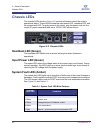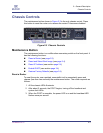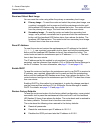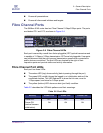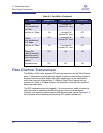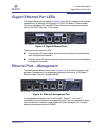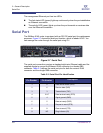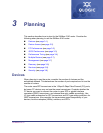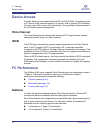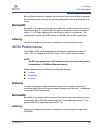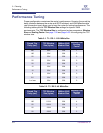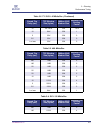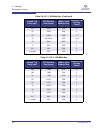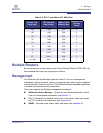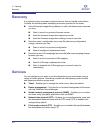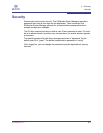
3 – Planning
Device Access
3-2 FI0154601-00 C
S
Device Access
Consider device access needs within the FC and iSCSI SANs. Controlling access
to FC device LUNs requires mapping FC device LUNs to specific iSCSI initiators.
You may map LUNs to more than one initiator. Giving multiple initiators access to
a LUN requires access management.
Fibre Channel
The Fibre Channel ports automatically discover all FC target devices, whether
connected directly (loop) or by fabric (switch).
iSCSI
The iSCSI ports automatically present targets discovered on the Fibre Channel
ports. If the FC target’s LUN 0 is a controller LUN, it becomes accessible
(mapped) to all iSCSI initiators. All data LUNs are inaccessible until mapped. The
exception to this is if LUN 0 is a controller LUN, then it is mapped automatically to
allow for management of the FC target controller.
When an iSCSI initiator logs on, the router records the initiator’s iSCSI name and
IP address. The management interface [command line interface (CLI) and
SANsurfer Router Manager] uses the initiator information to simplify the mapping
process.
FC Performance
The SANbox 6140 router supports Fibre Channel service at transmission rates of
1 Gbps or 2 Gbps with a maximum frame size of 2148 bytes. Related
performance characteristics include the following:
Distance (see page 3-2)
Bandwidth (see page 3-3)
Latency (see page 3-3)
Distance
Consider the physical distance between Fibre Channel devices. Choose SFP
transceivers that are compatible with the cable type and distance.
Each Fibre Channel port is supported by a data buffer with a three-credit capacity;
that is, three maximum sized frames. For fibre optic cables, this enables full
bandwidth over the following approximate distances:
5 kilometers at 1 Gbps (0.6 credits/Km)
2.5 kilometers at 2 Gbps (1.2 credits/Km)



